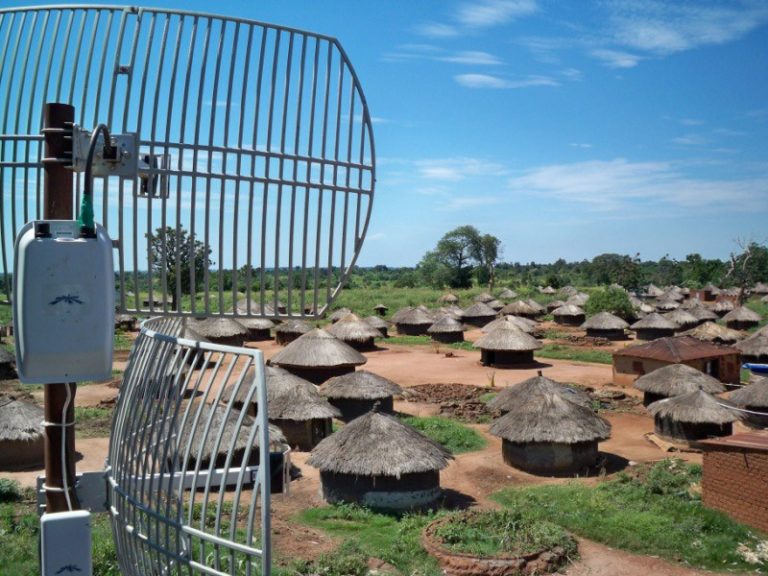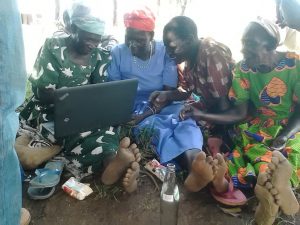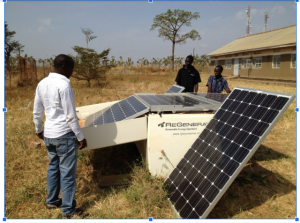This is part of our series of blogs on Community Networks.
Battery Operated Systems for Community Outreach (BOSCO) Uganda is a faith-based private, not for profit organization under the Archdiocese of Gulu that provides Internet connection and capacity building in Northern Uganda.
BOSCO Uganda was founded as an emergency response to the 1986-2008 conflict between the Government of Uganda and the rebel of the Lord’s Resistance Army (LRA). It brought internet and Voice over Internet Protocol (VoIP) telephony to the 28,000 square kilometers area of conflict in Northern Uganda. BOSCO visualises a digitally inclusive and globalized society whose mission is to build peace through development.
It is the only Community Network Organization in Uganda that uses high speed, long-range Wi-Fi frequency of 2.4GHz and 5.8 GHz. It has evolved into an Organization that embraces a web-based approach to knowledge sharing about emerging ecological challenges, entrepreneurial and marketing opportunities of Northern Uganda’s majorly women and youth society. Its longest WiFi range connectivity goes up to 176 Kilometers North East of Uganda. BOSCO has 32 clients connected to the internet. These clients include radio stations, ICT Centres, churches, mosques, and community-based organizations.
Uganda at a glance.
Broadband coverage in Uganda is minimal, with 70% urban-rural gap in Internet usage. About a third (30%) of urban area dwellers and 9% of Ugandans living in rural areas have access to the Internet. 65% of the Ugandan population is covered by 3G and only 17% covered by LTE/4G. Uganda has a GNI per capita of USD 1 820.
The Internet service providers in Uganda can be classified into two: mobile ISPs and Fixed-line Wired/Wireless ISPs. Mobile ISPs are providers that use mobile data connectivity to supply the internet by the use of 3G/4G LTE on Smartphones, and 3/4G LTE MiFis Routers which use sim cards to connect to the Internet. The biggest ISP players in Uganda are MTN, Smile and Airtel Uganda. Fixed-line Wired/Wireless ISPs use both Wired and Wireless medium of connectivity for last-mile connectivity; this can be fibre, copper, coaxial, or satellite.
Cost of the Internet in Uganda.
- RENU: unlimited bandwidth is USD50 per MBps per month.
- NITA-U and Soliton Tel-Mec Internet: unlimited bandwidth is USD 80 per 1 Mbps / per month. However, a separate consideration for BOSCO Uganda as a Community Network has been made after negotiations.
- MTN: Unlimited bundle – UGx330,000 (USD90) per month however, the speed is capped when the daily 3 GB data bundle is depleted. The speed is not consistently unlimited.
- Airtel: has no unlimited data bundle but offers data rates ranging from UGx 250 (USD 0.07) to UGx 150,000 (USd40) depending on the bundle size. For example, 1.5GB monthly bundle, and 3GB daily bundle each cost UGx10,000 (USD2.7)
- Africell: Has unlimited data bundle of UGx300,000 (USD82) per month but the speeds are throttled.
- Zuku: uses Fiber connectivity with limited coverage to Kololo, Bukoto, Ntinda and Bugolobi and offers packages in two forms. Triple play package which combines internet along with TV and phone services with unlimited high internet speeds of 10Mbps for UGx 147,900 (USD40), 20Mbps for UGx 197,900 (USD54), 40Mbps for UGx 297,900 (USD81) and 100Mbps for UGx 497,900 (USD 136) per month with no Fair Usage Policy (FUP). Their business package costs are 10Mbps for UGx 159,900 (USD44, 20Mbps for UGx 279,900 (USD77) and 40Mbps for UGx 479,900 (USD131) per month.
- Roke Telkom: It uses microwave technology and has several packages; 40GB for UGX 100,000 during peak hours (7 AMto 7 PM), and free internet access on weekdays (7 PM to 7 AM), weekends, and public holidays. 5Mbps internet speeds at UGx 250,000 per month. However, once you clock 100GB worth of data, the internet slows down to 1Mbps until the bundle’s expiry date, with 7 PM to 7 AM (off-peak hours) and weekdays not being counted on the FUP policies. Roke provides internet across the wider Kampala Metropolitan region including Ntinda, Nalya, Bugolobi, Najjera, Kira among others.
- Liquid Telecom; Liquid Telecom uses microwave technology starting from 10Mbps unlimited internet speed at UGx 120,000 (USD33) per month..
Enough of the commercial break.
BOSCO is registered by the Uganda Communication Commission (UCC). It operates on 802.11 unlicensed spectrum. This was chosen considering the range and speed of the unlicensed spectrum IEEE 802.11(b, g, n, ac) (2.4Ghz & 5Ghz). UCC charges community networks USD500 for license fee application, and USD1000 annual license renewal.
Only 15% of Ugandans have access to the electricity grid. BOSCO uses solar-powered computers connected to their network. They also connect their members to VoIP telephony creating a network of sites across the region. These networks are schools, healthcare centres, NGO offices, local government offices, and internally displaced communities affected by the conflict between the formerly the Lord’s Resistance Army and government forces. BOSCO helps to increase collaboration among service providers using these communication systems while ending the isolation that the rural Acholi people have experienced because of the war in Northern Uganda.
With a mission to provide innovative ICT solutions using a collaborative and web-based approach to foster socio-economic development and peacebuilding in rural communities in Northern Uganda, BOSCO has leveraged networks to develop global partnerships in an ecosystem approach to tap synergies between energy, business infrastructure development and ICT. Currently, the organization has a total of 54 centers in several areas; Gulu, Amuru, Nyoya, Pader, Agargo, Kitgum, Lamwo, Oyam, Omoro, Lira, Adjumani, Yumbe, Arua districts and operates over 30 solar-powered ICT labs, and five larger microgrids, two of which are 30 kWpw that are sustainable economically through a slow payback of capital expense by the users.
BOSCO Uganda Partners
- Schools, Universities (internship placements), churches, health Centres, hospitals, media houses, mosques, organizations, and vocational schools.
- Local and Central Government partners: at various levels, Network Information Technology Authority of Uganda (NITA-U) working closely with SOLITON Telmec, UCC, sub-county headquarters, and local councils.
- Donor Partnership: various local and international donors who support its work either financially (grants) or materially. Examples include UNICEF, DKA-Austria, Geneva Global, APC, HORIZONT3000, Internet Society, FIRE Africa, AFRINIC, SIGNIS, Trocaire, University of Notre Dame, Accenture, Internet Society, and HP.
- For clean energy system collaboration, BOSCO Uganda relies on a ten years-long experience with BBM, an Austrian organization that focuses on alleviating poverty, provision of clean energy through the Solar Power system.
BOSCO Uganda is sustainable in several ways; by receiving funding from BOSCO INC. based in the USA, which fundraises to meet BOSCO Uganda’s operational costs, donor funding, and clients who pay monthly subscriptions. Thre is also incomes from vehicle hire, and ICT Centres. However, the local revenue base is very minimum.
BOSCO engages the community in several activities. The community plays a management role at the ICT centres established in partnership since they own most of the buildings. BOSCO involves the community in needs-based assessments to help identify their challenges before projects are initiated. Assessment is done using well-developed assessment tools that focuses on the functionality of the group. The communities usually have office space where the ICT facilities are installed. The communities have to have a good working relationship with the local government, and willing to provide training once trained as ToTs. They are also expected to provide security to the network infrastructure.
BOSCO enhances the capacity of its staff by first identifying gaps that require to be filled. The staff undergoes periodic performance appraisal. Staff technical assessments are conducted by external consultants on systems maintenance. Feedback from clients helps bridge the capacity gaps identified.
BOSCO encourages the communities to freely express themselves and so, the communities are at liberty to tell BOSCO Uganda what skills they require. Training is then conducted either at an individual or group level. For advanced learning, both the staff and the community are encouraged to use the Internet.
BOSCO uses the local Acholi language alongside English during community training to curb the language barrier. Their training manuals have been customized to the local language. In West Nile especially in the South Sudanese settlement camps, English is used. From the training done so far, the language barrier has not been witnessed since most of the training is practical. BOSCO Uganda also has a resource base of persons who are identified by the community/groups and so conduct training within contextual knowledge.
You may also want to read about a site visit to BOSCO Uganda by Josephine Miliza.
Blog by Nzambi Kakusu and Mwendwa Kivuva.
Special thanks for contributions from Immaculate Laker and Solomon Okot who are the technical assistant and the technical manager at BOSCO Uganda respectively.






